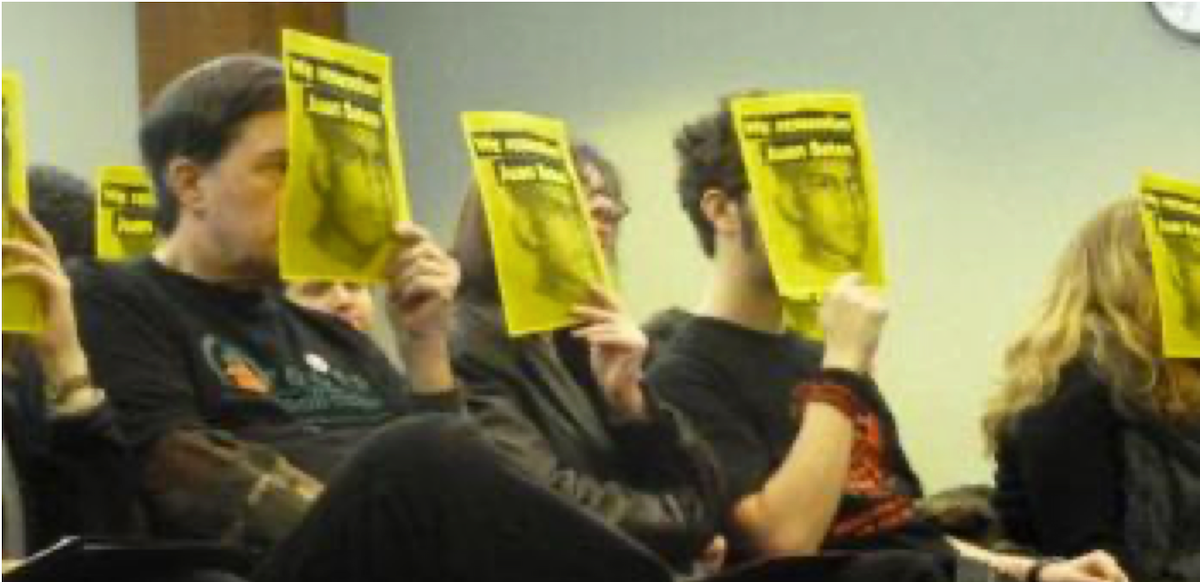Slingshot: Children on the Killing Floor

Protesters raised pictures of Juan Baten, a food worker killed in Brooklyn in 2011 because a safety guard was removed from a dough-mixing machine. They were protesting at a meeting of the New York City Economic Development Corporation March 20, 2011.
The first labor story I ever wrote was about the death of Juan Baten, a 22-year-old Guatemalan worker who was killed on the job at a food warehouse in Brooklyn in 2011. Baten got pulled into a mixing machine that lacked the required safety guard.
It hit me particularly hard, because I had been 12 years old when I became an apprentice baker, cooking bagels in an industrial oven. I’d recoil in a sort of dance to avoid burning myself after shoving the bagels into the furnace mouth on a wide wooden paddle and dislodging them with an upward jerking motion.
The jerky motion required some finesse, and so did quickly loading up the paddles. As my co-worker retrieved one batch of fully cooked bagels, I shoved another into the oven.
After school on weekdays, I mixed the dough in an industrial machine, rolled the bagels into perfect ovals, and stored them in the cooler to cook them on Saturdays with an amiable undocumented worker from Mexico. Meanwhile my mother worked at a paper mill and my father drove a cab, each of us chipping in to cover the costs of running a household.
A TIME WARP
The number of minors found by the government to be employed in violation of child labor laws increased 37 percent in 2022 over 2021 and 283 percent over 2015, according to the Economic Policy Institute.
Recently the Wisconsin-based company Packers Sanitation Services paid a $1.5 million fine for illegally employing 102 minors to clean 13 meatpacking plants in eight states, according to the Department of Labor. The children handled dangerous chemicals to clean saws and head-splitters at plants owned by meat processing giants JBS, Tyson, and Cargill.
A 13-year-old Guatemalan girl worked the night shift at a JBS plant in Grand Island, Nebraska, where she scoured “blood and beef fat from the slippery kill floor, using high-pressure hoses, scalding water and industrial foams and acids,” according to The Washington Post. A school nurse learned about the girl’s night job after finding “chemical burns, blisters and open wounds on her hands and one knee.”

SUPPORT LABOR NOTES
BECOME A MONTHLY DONOR
Give $10 a month or more and get our "Fight the Boss, Build the Union" T-shirt.
In Kentucky, employers were fined $212,544 when more than 300 minors were found to be working at McDonald’s. Children as young as 10 were not only working, but also having their wages stolen.
That’s how billionaires become billionaires—by cutting corners on safety, forcing us to work at unsafe speeds, and not paying us for the full value of the work we do.
These worsening conditions can feel as if the bosses have put us in a time warp, winding back the clock on child labor laws and worker safety.
BIGGEST AND WORST
April 28 marked Workers Memorial Day, commemorating those killed, sickened, or injured on the job. An average of 27 U.S. workers per day suffer amputation or hospitalization.
Among the worst offenders are some of the world’s biggest companies, including Amazon, FedEx, Tesla, Tyson, Kroger, and Walmart, as well as bigwigs in the railroad, chemical, and airline services industries. (Shamefully, the U.S. Postal Service has the single highest number of severe injuries.)
Food processing is particularly dangerous. The meatpacking and poultry industries employ half a million workers, disproportionately immigrants and people of color. Their crushing toil puts them at high rates of amputations, broken bones, illnesses, and fatalities.
“We are organizing to put an end to the sweatshop conditions that poison our food supply industry,” Brandworkers member Juan Romero said a decade ago, at a meeting to protest the death of Juan Baten. “We will not rest until dignified jobs and healthy food replace these conditions.”





